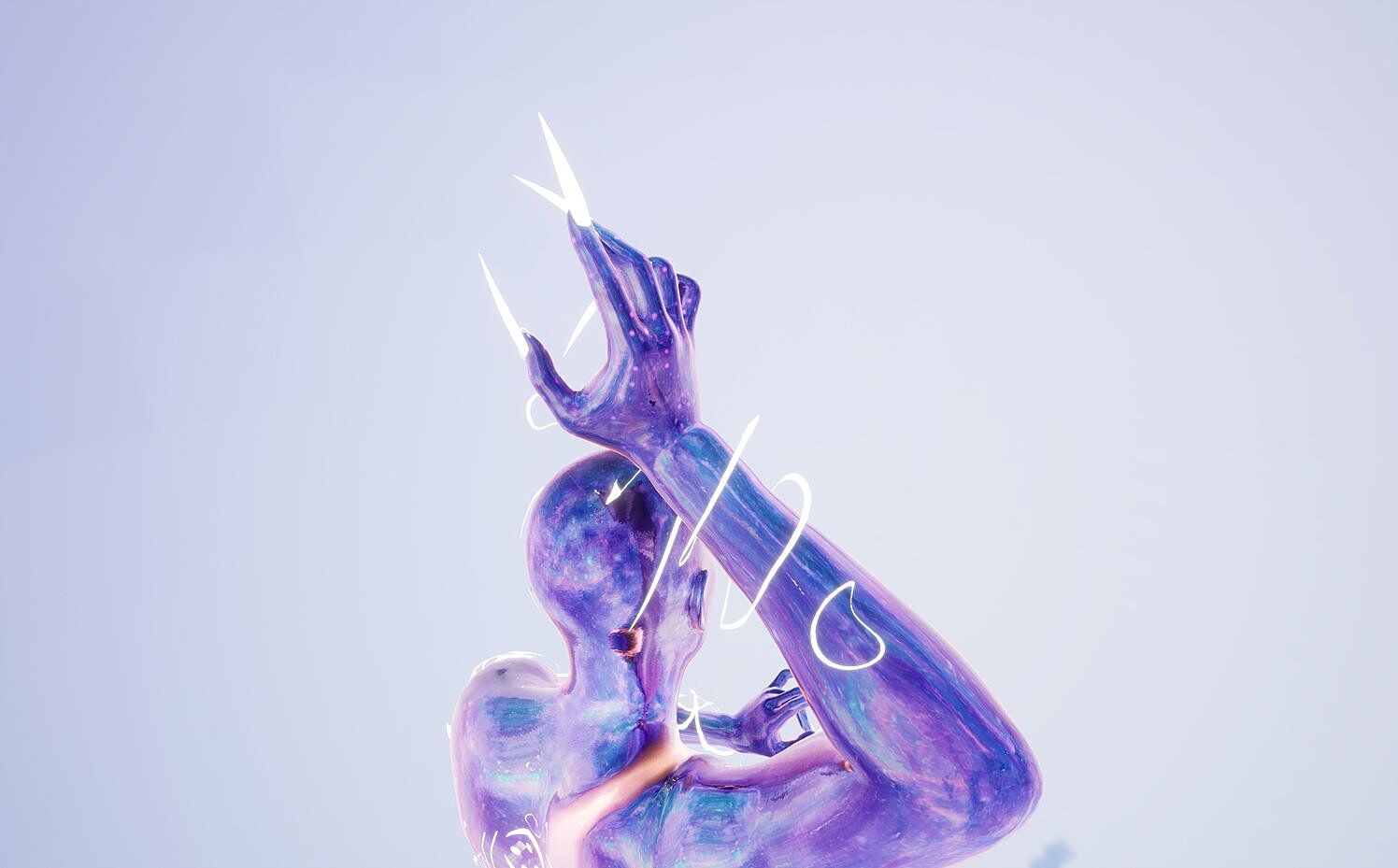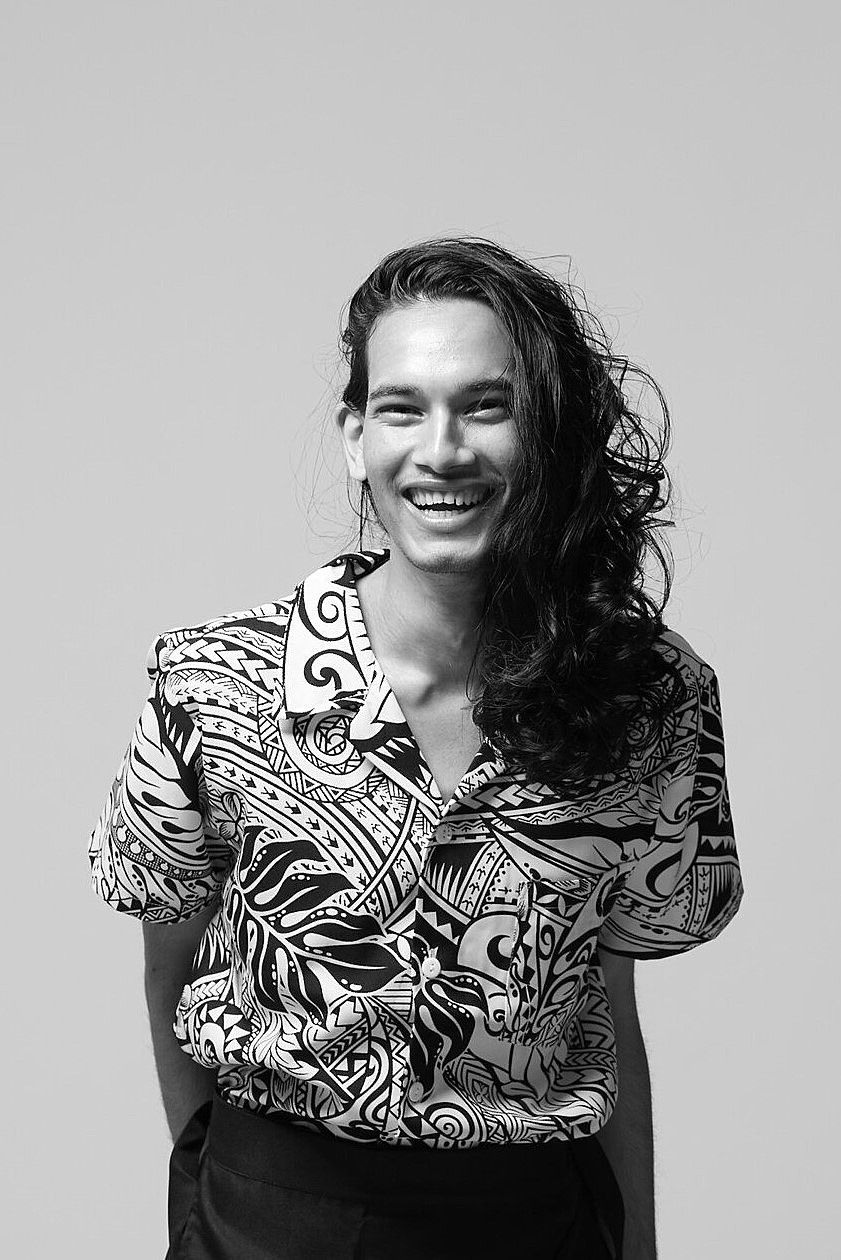The Genderless Void: A Review of ATUA
Augmented reality installation ATUA claims space for Indigenous Queerness through Te Kore, the void.
I was born Vaka sa lewa lewa and Hijra in Fiji, a colonised Christian nation. As a child, I lived in emptiness. My Queerness isolated me from the world. I couldn't accept that I was Queer because I was told that doing so would mean being disowned by my family and community – everything I had ever known and loved. I had never imagined that, at just 22, I would have an experience so powerful it would transcend me from the physical realm into the spiritual world and connect me to my ancestors.
ATUA has done just that. Premiering this week at Sundance Film Festival 2022, the augmented reality (AR) installation, created by Tanu Gago and Jermaine Dean of FAFSWAG, explores Indigenous Queerness through Te Kore, the void. FAFSWAG is a collective of artists who speak to their contexts as Queer Indigenous arts practitioners through collaborative work activated in public and digital spaces. In ATUA, Te Kore is manifested as a digital being in an interactive AR visual space that unifies the cultural, spiritual and physical realms.
*
From an intergalactic portal appears Te Kore, a cosmological sculpture embodying the universe's origin. Voiced by screen actor Nathaniel Lees and modelled after non-binary Māori artist Jermaine Dean, Te Kore is adorned with Indigenous markings. Te Kore wears stars on their face to tell the story of voyagers who used the skies to navigate to the shores of the Moana. Their shoulders carry a solar flare eclipse, and their chest recounts the movement of the tides. Rippling portals circle the forearms, the legs marked by Indigenous tools and ankles hugged by mountains representing the land we walk on and the heritage we derive from it. The sound of thunder and strong ocean waves accompanies the arrival of Te Kore, creating a feeling of mighty chaos wielding the power of a revolution.
Te Kore, the void, draws an analogy from the livelihoods of Indigenous Queer people. Before the Europeans brought the unholy pairing of Christianity and colonisation into our lands in the Moana, Queer people were integral to the survival of Indigenous populations. Colonisation stripped Indigenous people of their rich Queer identities and conditioned them with homophobia, transphobia and queerphobia.
Te Kore thrives on chaos, and that's what I love the most about them. They defy civility
I am often told that my generation is getting weirder. My generation of Indigenous people is not getting weirder. We are no longer putting up with the colonial erasure of Indigenous Queerness. There aren't many old Indigenous Queer people because they are dead. I have felt that emptiness every time I searched desperately for a sense of belonging to no avail. Te Kore, the predecessor to creation, embodies that feeling of emptiness. While acknowledging that emptiness, Te Kore holds endless possibilities and unlimited potential. Te Kore demands the reclamation, restoration and liberation of Indigenous Queerness through oral storytelling. Te Kore, like Indigenous Queer people, holds within them the power to set us free from the shackles of colonialism.
Te Kore thrives on chaos, and that's what I love the most about them. They defy civility. When Indigenous Queer people challenge the status quo, we are labelled uncivil and unkind. White men use standards of civility to cancel and deplatform anyone who retaliates against the status quo, which has helped them maintain their power for centuries. Once marginalised people are labelled uncivil, we lose our power in colonial systems. But there is nothing civil, kind or respectable about how white men came to rule the world. There was nothing kind about colonisation, genocide, rape, criminalisation and oppression of Indigenous people. The reality is that people in power expect marginalised people to be civil and kind in the face of oppression and injustice. Those of us who refuse to abide by the game's rules are not allowed to play. Te Kore is disobedient to the status quo, demanding the fall of the colonial patriarchy.
The recital of Indigenous Queer identities sent shivers down my spine. Mahu (Hawai‘i and Tahiti), Vaka sa lewa lewa (Fiji), Palopa (Papua New Guinea), Fa‘afafine (Sāmoa), Akava‘ine (Rarotonga), Fakaleiti (Tonga), Fakafifine (Niue), Takatāpui (Aotearoa)
The recital of Indigenous Queer identities by Te Kore sent shivers down my spine. Mahu (Hawai‘i and Tahiti), Vaka sa lewa lewa (Fiji), Palopa (Papua New Guinea), Fa‘afafine (Sāmoa), Akava‘ine (Rarotonga), Fakaleiti (Tonga), Fakafifine (Niue), Takatāpui (Aotearoa). One of the saddest things to happen to Indigenous genders is the creation of the colonial man–woman binary and the othering of Trans and non-binary folk. Trans and non-binary people were never the ‘third gender’, they were a gender alongside men and women.
In iTaukei society, there were tagane, lewa and Vaka sa lewa lewa. And that was it. There was no othering of Vaka sa lewa lewa. Pacific Queer people feel like displaced people in their own home. The Pacific was once the home of Indigenous Queer people, but it has become a hostile host now. ATUA reminds us that Pacific Queer people can never be displaced or lost because we are seeds sown into the spiritual world. We may not know all our ancestors, but they know us, and their arms are wrapped around every piece of our DNA.
I'd forgotten how much I'd suppressed my Queerness. Te Kore confronted me
Indigenous Queer people deserve stories that imagine an alternative world in which we are accepted and celebrated. Though only for a moment, Te Kore transcended me to the spiritual realm, and that feeling of joy gave me hope to continue fighting and living in a world that gives me very few reasons to. But my encounter with Te Kore wasn't all pleasant. At first, I feared Te Kore. Then I was overwhelmed with emotion. It wasn't Te Kore I feared. It was the thought of accepting an experience that had the potential to free me.
I have been Queer my whole life, but, existing in a world of compulsory heterosexuality and cisgenderism, I'd forgotten how much I'd suppressed my Queerness. Te Kore confronted me. When years of suppressed emotions unleash themselves onto you in four minutes, you don't know whether to embrace it or run from it. I took Te Kore's lead. Te Kore doesn't exist to threaten you. They guide you to connect with your ancestors.
*
Authentic representation has the potential to change our lives. Tanu Gago and Jermaine Dean have my most profound respect. They have combined Indigenous knowledge, culture and artistry with digital advancement and created magic for Indigenous Queer people. ATUA has opened an intimate portal that allows Indigenous Queer people to connect with their ancestors and Gods. ATUA is a gift to Indigenous Queer people to trigger healing, growth and prosperity. It is an experience powerful enough to give you the chills, yet delicate enough to comfort your fears. I’ve yearned for such an experience my entire life. I felt I belonged to the Pacific, connected and devoted to my land, culture, ancestors and Gods. I am indebted to the creators of ATUA for gifting me ethereal joy.
I do not doubt that ATUA gives our ancestors hope for the future of the Moana. In ATUA, the rainbow marking on Te Kore's hips alludes to the future of Indigenous Queer people. A rainbow adorns the sky after the passing of the storm. Te Kore gives hope that our storm will pass too, that Indigenous queer people will be free one day. Te Kore knows that our power is ancestral, and the colonisers could never break us.



